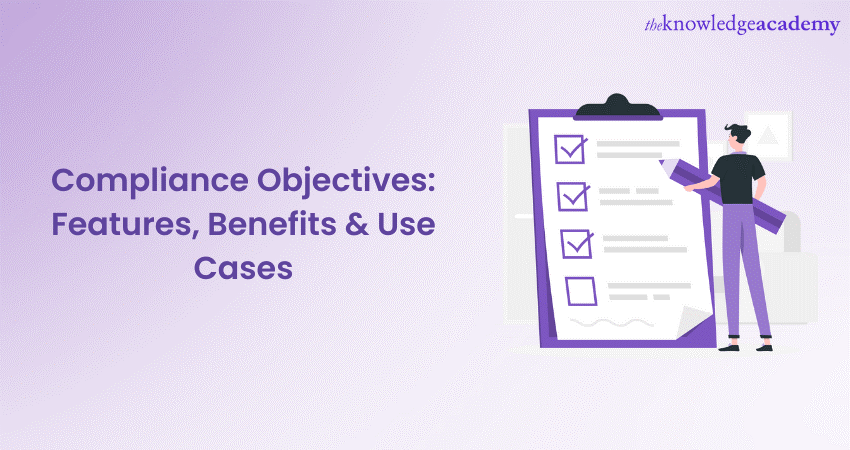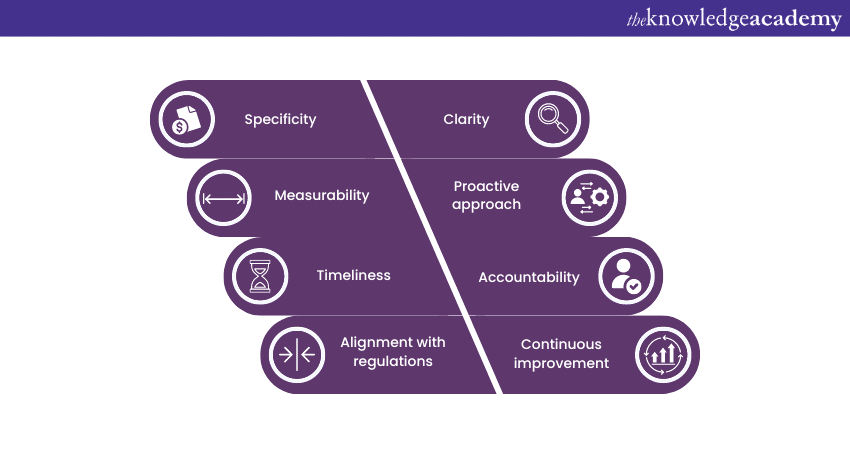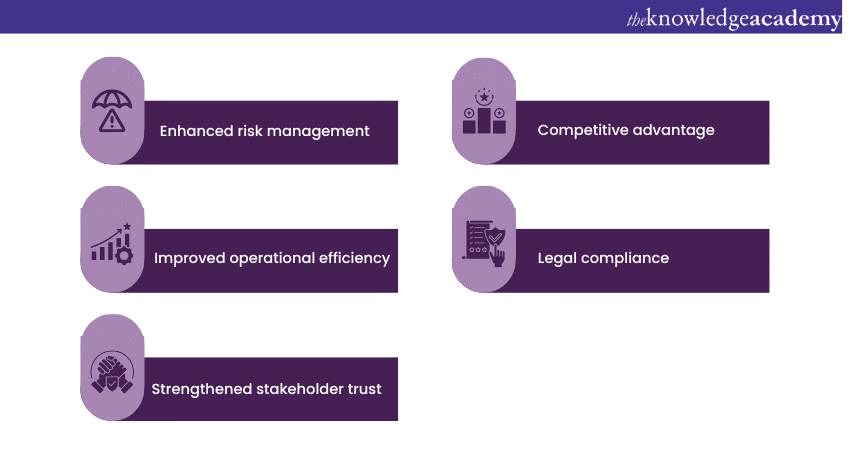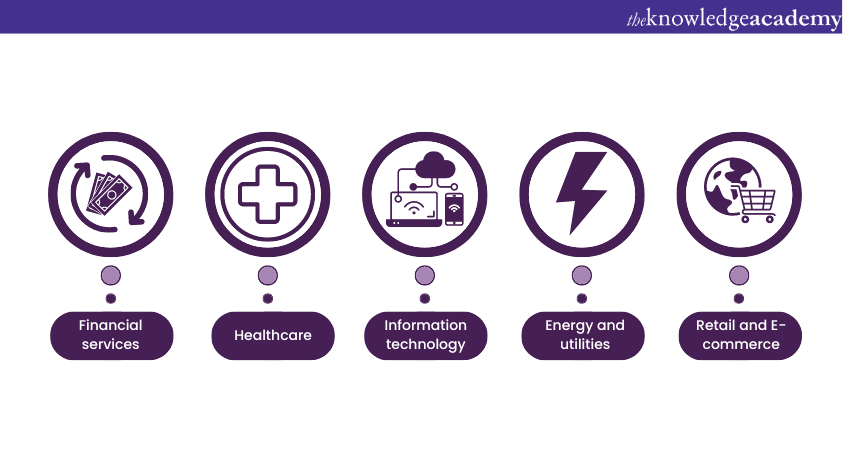We may not have the course you’re looking for. If you enquire or give us a call on 01344203999 and speak to our training experts, we may still be able to help with your training requirements.
We ensure quality, budget-alignment, and timely delivery by our expert instructors.

Compliance Objectives are essential for organisations to navigate regulatory requirements, mitigate risks, and maintain ethical conduct. Additionally, they refer to specific goals and targets that ensure adherence to laws, regulations, and policies.
According to Thomson Reuters Cost of Compliance Report of 2022, the lack of skilled resources made up for about 36 per cent of the challenges for compliance officers. This blog discusses how the organisation's management and staff must abide by all applicable laws, rules, and regulations according to the Compliance Objectives.
Table of Contents
1) Understanding Compliance Objectives
2)) Exploring the key features of Compliance Objectives
3) Looking at the benefits of Compliance Objectives
4) Investigating the use cases of Compliance Objectives
5) Conclusion
Understanding Compliance Objectives
Compliance Objectives are integral to the effective governance and ethical conduct of organisations. Businesses can comprehend the concept of Compliance Objectives, thereby navigating regulatory landscapes, mitigating risks, and fulfilling legal obligations.
Additionally, Compliance Objectives refer to the specific goals and targets set by organisations to ensure adherence to relevant laws, regulations, and policies. These objectives provide a framework for guiding employees' behaviour, decision-making, and operational processes. They define the desired outcomes and actions necessary to maintain integrity and minimise potential violations.
Furthermore, it is crucial to recognise their importance. Setting Compliance Objectives helps businesses stay in line with applicable laws and regulations, reducing the risk of penalties, lawsuits, and reputational damage. Moreover, Compliance Objectives enable proactive risk management by identifying potential risks and establishing measures to address them.
More importantly, certain features contribute to the effectiveness of the Compliance Objectives while they are being defined. They should be specific, measurable, timely, and aligned with regulations. Specificity ensures clarity and understanding, while measurability enables the evaluation of progress.
Timeliness basically ensures that compliance activities are completed within expected timeframes, and alignment with regulations keeps objectives up to date with changing requirements.

Exploring the key features of Compliance Objectives
Compliance Objectives comprise some key features, discussed as follows:

a) Specificity: Compliance Objectives should be specific and well-defined, leaving no room for ambiguity. Clear objectives help employees understand what is expected of them and enable accurate measurement of compliance performance.
b) Measurability: Objectives should be measurable to evaluate progress and assess compliance levels. Organisations can define quantifiable metrics or key performance indicators (KPIs), thereby tracking their compliance efforts and identifying areas for improvement.
c) Timeliness: Compliance Objectives should have realistic timelines for completion. Setting deadlines ensures that activities related to compliance are completed within the expected timeframes and reduces the risk of non-compliance due to delays.
d) Alignment with regulations: Compliance Objectives should align with relevant laws, regulations, and industry standards. Organisations can keep their objectives up to date with regulatory changes, thereby adapting to evolving compliance requirements and avoiding potential violations.
e) Clarity: Compliance Objectives should be clearly communicated to all stakeholders involved. They should be easily understandable and unambiguous, ensuring that everyone collectively understands compliance expectations
f) Proactive approach: Compliance Objectives should emphasise a proactive approach to risk management. Organisations can identify potential risks and establish preventive measures, thereby mitigating compliance-related risks before they escalate.
g) Accountability: Compliance Objectives should establish clear lines of accountability within the organisation. Employees should understand their roles and responsibilities for achieving Compliance Objectives, promoting a culture of accountability.
h) Continuous improvement: Compliance Objectives should encourage continuous improvement in compliance practices. Regular evaluation and review of objectives allow organisations to identify areas for enhancement and implement necessary changes.
Acquire a better understanding of Effective Compliance by signing up for the Effective Compliance Training Course now!
Looking at the benefits of Compliance Objectives
Implementing Compliance Objectives offers numerous benefits for organisations. Here are some key

a) Enhanced risk management: Compliance Objectives help organisations identify, assess, and mitigate risks effectively. They should further focus on compliance-related risks, thereby establishing controls and processes that minimise potential vulnerabilities.
b) Improved operational efficiency: When Compliance Objectives are integrated into business operations, organisations can streamline processes and reduce inefficiencies. Compliance-driven practices often lead to improved workflows and optimised resource allocation.
c) Strengthened stakeholder trust: Organisations that demonstrate a commitment to compliance will build trust among their stakeholders, including customers, investors, and regulators. Compliance Objectives typically showcase ethical behaviour, integrity, and responsible business practices.
d) Competitive advantage: Effective compliance management can provide a competitive edge in the marketplace. Organisations that prioritise Compliance Objectives position themselves as trustworthy partners, attracting customers who value ethical conduct.
e) Legal compliance: Compliance Objectives ensure organisations stay in line with applicable laws and regulations. Businesses must ensure to set their objectives related to the legal requirements, thereby reducing the risk of penalties, lawsuits, and reputational damage.
Learn how you can be more compliant with law, regulation and company policy by signing up for Compliance Training Courses now!
Investigating the use cases of Compliance Objectives
Compliance Objectives find applications across various industries and sectors. Let's explore some notable use cases:

a) Financial services: Banks and financial institutions establish Compliance Objectives, with the help of a Compliance Manager, to ensure adherence to regulations such as Anti-Money Laundering (AML) and Know Your Customer (KYC). These objectives aim to prevent fraud, maintain data privacy, and protect customers' financial interests.
b) Healthcare: In the healthcare industry, Compliance Objectives focus on patient privacy (HIPAA), medical billing practices (Medicare/Medicaid), and quality standards (ISO 9001). Compliance efforts help protect patient information, ensure accurate billing, and deliver safe and reliable healthcare services.
c) Information technology: IT companies establish Compliance Objectives to address cybersecurity risks, data protection laws (e.g., GDPR), and software quality standards (ISO 27001). Compliance Objectives in IT emphasise the protection of sensitive data, secure software development practices, and robust IT infrastructure.
d) Energy and utilities: Compliance Objectives in this sector may involve environmental regulations, safety standards, and grid reliability. They ensure responsible energy generation, minimise environmental impact and maintain operational integrity.
e) Retail and E-commerce: Compliance Objectives in this industry focus on consumer protection laws, data privacy regulations, and payment security standards (PCI DSS). By meeting these objectives, businesses can safeguard customer information, ensure fair trading practices, and protect against fraud.
Want to excel in your compliance interview? Explore key Compliance Interview Questions and get prepared with expert answers to leave a lasting impression on interviewers.
Conclusion
Compliance Objectives play a vital role in the governance and ethical conduct of organisations. They enhance risk management, improve operational efficiency, strengthen stakeholder trust, and provide a competitive advantage. More importantly, they serve as a compass for ethical behaviour, guiding businesses towards long-term success in a complex and ever-changing business environment, especially when outlined clearly in a GDPR Privacy Policy PDF, ensuring that companies adhere to privacy standards and build trust with their customers.
Organisations should adhere to best practices and integrate Compliance Objectives into their daily operations. As a result, they achieve their compliance goals, ensure integrity, and foster a culture of trust and responsible business practices.
Learn to improve organisational effectiveness and Compliance, by signing up for the Corporate Governance: Principles and Practices Training now!
Upcoming ISO & Compliance Resources Batches & Dates
Date
 PCI DSS Implementer
PCI DSS Implementer
Thu 3rd Apr 2025
Thu 5th Jun 2025
Thu 7th Aug 2025
Thu 2nd Oct 2025
Thu 4th Dec 2025






 Top Rated Course
Top Rated Course


 If you wish to make any changes to your course, please
If you wish to make any changes to your course, please


